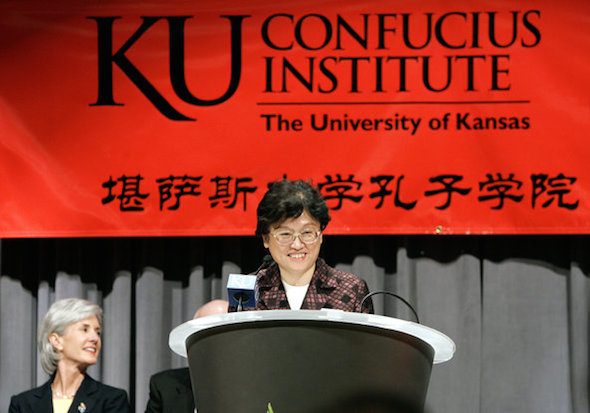U.S. Professors Call on Colleges to Re-evaluate Confucius Institutes
Sinosphere
By AMY QIN

The American Association of University Professors is calling on universities to uphold principles of academic freedom by either terminating or renegotiating the agreements that have brought nearly 100 Chinese government-backed cultural and language programs called Confucius Institutes to campuses across the United States and Canada.
In a statement prepared this month by its Committee A on Academic Freedom and Tenure, the A.A.U.P. argues that colleges and universities in the United States have sacrificed the independence and integrity of their institutions and staff by allowing the Chinese government to set guidelines for the recruitment and supervision of academic staff, the design of the curriculum and boundaries on debate within the Confucius Institutes.
“Confucius Institutes function as an arm of the Chinese state and are allowed to ignore academic freedom,” the statement said.
“Most agreements establishing Confucius Institutes feature nondisclosure clauses and unacceptable concessions to the political aims and practices of the government of China,” it added.
Widely recognized as one of China’s most ambitious cultural diplomacy endeavors to date, the Confucius Institute program has been embraced by universities around the world as a cost-effective way to offer Chinese language and culture instruction to students. In less than a decade since the first institute was established in Seoul, South Korea, in November 2004, the program, which is heavily subsidized by the Chinese government, has grown to include more than 400 Confucius Institutes in over 100 countries and regions, according to the state news agency Xinhua, citing Xu Lin, head of the Confucius Institute Headquarters in Beijing.
But with its statement on Confucius Institutes, the A.A.U.P. joins a larger movement of universities and academics who have in recent years begun to push back against the program. Last December, the Canadian Association of University Teachers released a similar statement calling on universities to sever ties with the institutes, citing two instances in which universities in Canada either rejected or terminated an agreement to host Confucius Institutes over concerns about the program’s threat to academic freedom.
In one of those cases, McMaster University in Ontario decided to close its Confucius Institute in 2012 after a teaching assistant at the university’s Confucius Institute filed a complaint against the university with the Human Rights Tribunal of Ontario accusing the institute of discriminatory hiring practices. The teaching assistant, Sonia Zhao, alleged that by requiring her to conceal her belief in Falun Gong, a spiritual movement banned in China, the university was “giving legitimation to discrimination.”
In an update on its website last summer, the university said the institute’s hiring process “excluded certain classes of applicants, which is not consistent with the university’s values of equality and inclusivity, nor with McMaster’s anti-discrimination policy.”
The A.A.U.P. statement cited a magazine essay about Confucius Institutes written by Marshall Sahlins, professor emeritus of anthropology at the University of Chicago, which was published in The Nation last October. Mr. Sahlins wrote that the Confucius Institutes “appear to have met more serious resistance in Canada and elsewhere than in the United States.”
Beijing has appeared to be more accommodating in its negotiations with American universities, wrote Mr. Sahlins, especially when it has wanted to enlist a prestigious university such as Stanford University or the University of Chicago.
Despite the greater concessions, American universities still have found that agreements with Beijing often contain requirements that are at odds with their concepts of academic freedom. “There is a whole list of proscribed topics,” June Teufel Dreyer, a professor of Chinese government and foreign policy at the University of Miami, told The New York Times in 2012. “You’re told not to discuss the Dalai Lama — or to invite the Dalai Lama to campus. Tibet, Taiwan, China’s military buildup, factional fights inside the Chinese leadership — these are all off-limits.”
The sentiments expressed in the statements by the American and Canadian associations echo Mr. Sahlins’s conclusion:
“Prominent CI hosts should take the lead in reversing course, stressing that the issues involved are larger than their own particular interests,” Mr. Sahlins wrote. “By hosting a Confucius Institute, they have become engaged in the political and propaganda efforts of a foreign government in a way that contradicts the values of free inquiry and human welfare to which they are otherwise committed.”
Although both associations’ statements draw a comparison between the Confucius Institutes and other government-backed cultural programs such as the British Council and L’Alliance Française, an important difference, the associations note, is that the Confucius Institutes, unlike the others, are physically located on the university campuses.
